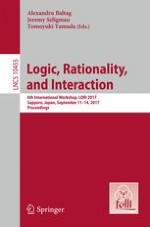2017 | OriginalPaper | Chapter
Logical Argumentation Principles, Sequents, and Nondeterministic Matrices
Authors : Esther Anna Corsi, Christian G. Fermüller
Published in: Logic, Rationality, and Interaction
Publisher: Springer Berlin Heidelberg
Activate our intelligent search to find suitable subject content or patents.
Select sections of text to find matching patents with Artificial Intelligence. powered by
Select sections of text to find additional relevant content using AI-assisted search. powered by
